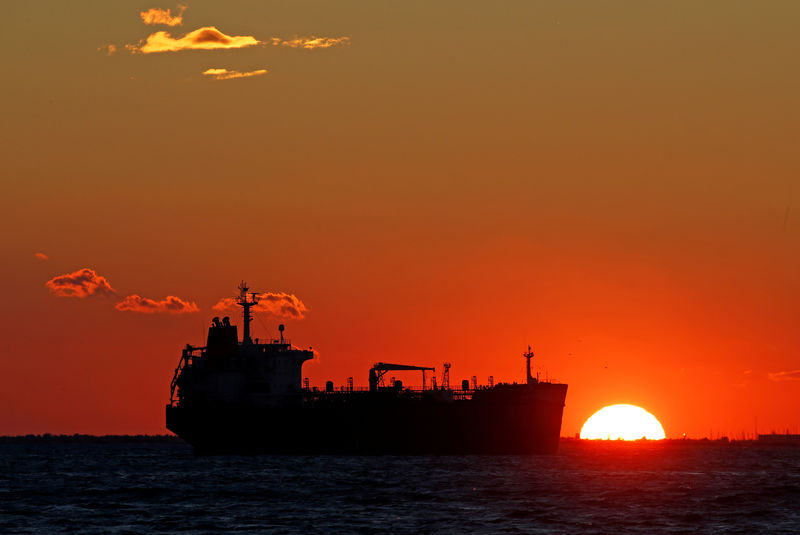(Bloomberg) -- Saudi Arabia said two of its oil tankers were attacked while sailing toward the Persian Gulf, adding to regional tensions as the U.S. increases pressure on Iran. Crude rose as much as 2%.
The tankers were damaged in “a sabotage attack” off the United Arab Emirates coast on Sunday, state-run Saudi Press Agency reported. The vessels were approaching the Strait of Hormuz, the world’s most important chokepoint for oil shipments.
The U.A.E. foreign ministry on Sunday reported an attack on four commercial ships. No one has claimed responsibility. Two of the targeted tankers were registered in Saudi Arabia, one was flagged in the U.A.E. and the other in Norway, according to a U.A.E. government official.
The precise nature of the incident remained unclear -- neither Saudi Arabia nor the U.A.E. said exactly what happened or identified potential culprits. The U.S. deployed an aircraft carrier, bomber planes and defense missiles to the region last week amid worsening friction with Iran, Saudi Arabia’s regional rival. U.A.E. stock markets posted their steepest decline in more than three years.
Saudi Energy Minister Khalid Al-Falih said the incident aims “to undermine the freedom of maritime navigation, and the security of oil supplies to consumers all over the world,” according to SPA. He urged the international community to ensure the security of oil tankers “to mitigate against the adverse consequences of such incidents on energy markets, and the danger they pose to the global economy.”
Strait of Hormuz, the World’s Most Important Chokepoint for Oil
Antagonism between the U.S. and Iran intensified this month after President Trump ended exceptions to U.S. sanctions on Iranian oil sales. The Islamic Republic has threatened to block oil shipments through the Strait of Hormuz if the U.S. halts Iranian energy exports and to scale back its obligations under the 2015 nuclear deal.
Crude Rises
Iran’s Foreign Ministry Spokesman Abbas Mousavi described the maritime incident as “concerning and regrettable” and called for efforts to shed light on what exactly happened, the semi-official Tasnim News reported. He warned against “foreign seditious plots to upset the region’s security and stability.”
Global crude benchmark Brent for July settlement rose as much as $1.38 on Monday to $72 a barrel on the London-based ICE (NYSE:ICE) Futures Europe exchange. Oil had been losing ground since late last month on signs that Saudi Arabia would pump more to make up for lost Iranian barrels and a looming trade war between the world’s two largest economies, the U.S. and China.
Rising geopolitical tension has also weighed on stock markets in the Gulf this week. Dubai’s benchmark dropped 4%, the most among major gauges tracked by Bloomberg globally. Saudi Arabia’s Tadawul All Share Index retreated 1.8%, and shares of Bahri, the kingdom’s biggest owner of oil tankers, dipped as much as 4.1% to their lowest value since 2013. Bahri owns the two Saudi tankers, according to data complied by Bloomberg.
Tanker War
The U.A.E.’s foreign ministry said it’s investigating the tanker incident with local and international parties. No one was hurt, and no fuel or chemicals were spilled, the state-run WAM news agency quoted the ministry as saying. One of the two Saudi tankers was on its way to the port of Ras Tanura to load oil for shipment to the U.S., according to SPA.
The targeted vessels were the Amjad, Al Marzoqah, A. Michel and Andrea Victory, according to the U.A.E. government official.
Attacks on oil tankers in the turbulent Gulf have been rare since 1991. Saudi Arabia continued shipping through the Strait of Hormuz during the so-called tanker war, a phase of the 1981-88 conflict between Iraq and Iran when both foes attacked vessels in the Gulf. Oil exports flowed also during the first Gulf War in 1990-91.
A Japanese tanker, the M. Star, was damaged in a bomb attack in 2010 when it was docked about 14 miles (22 kilometers) off the U.A.E. coast near the port of Fujairah. The Brigades of Abdullah Azzam, a militant jihadist group, claimed responsibility.
The Strait of Hormuz connects the Gulf to the Indian Ocean. Iran lies to the north and the U.A.E. and Oman to the south. Hormuz is the single most important waterway for global oil shipments, with tankers hauling about 40% of all the crude traded internationally every day. All oil exports from Kuwait, Iran, Qatar and Bahrain, more than 90% of those from Saudi Arabia and Iraq, and 75% of shipments from the U.A.E. pass through the strait.
